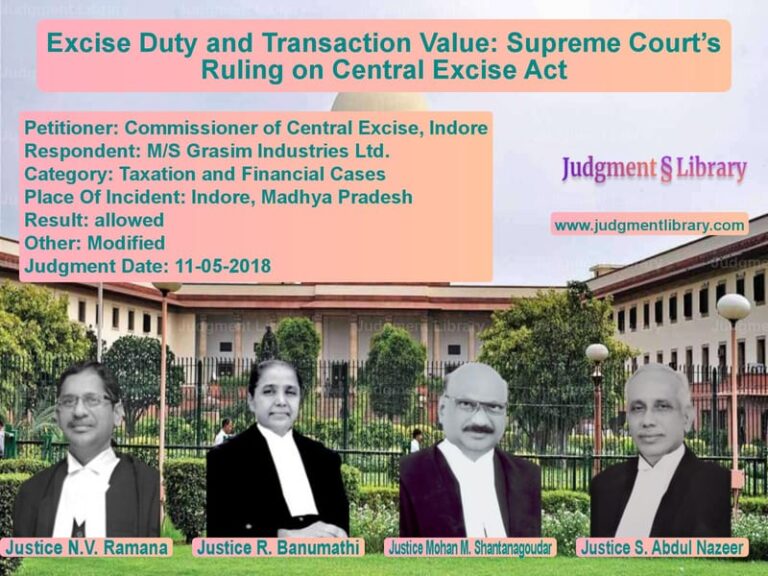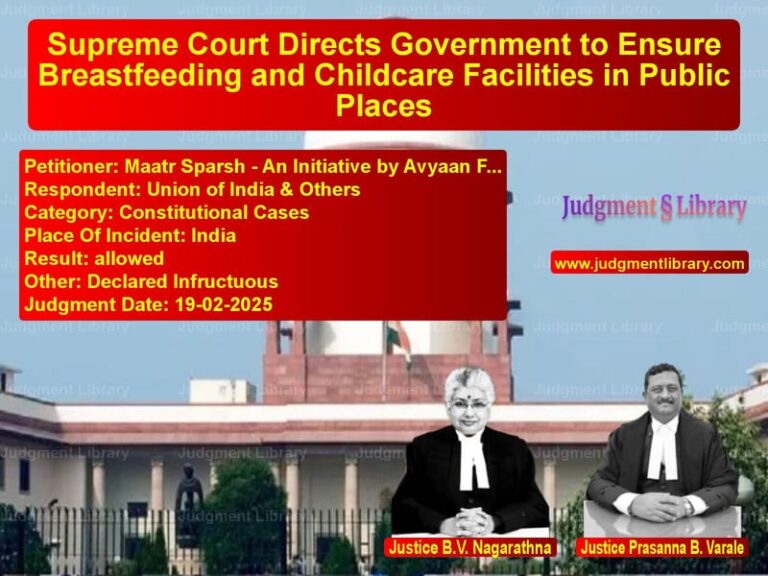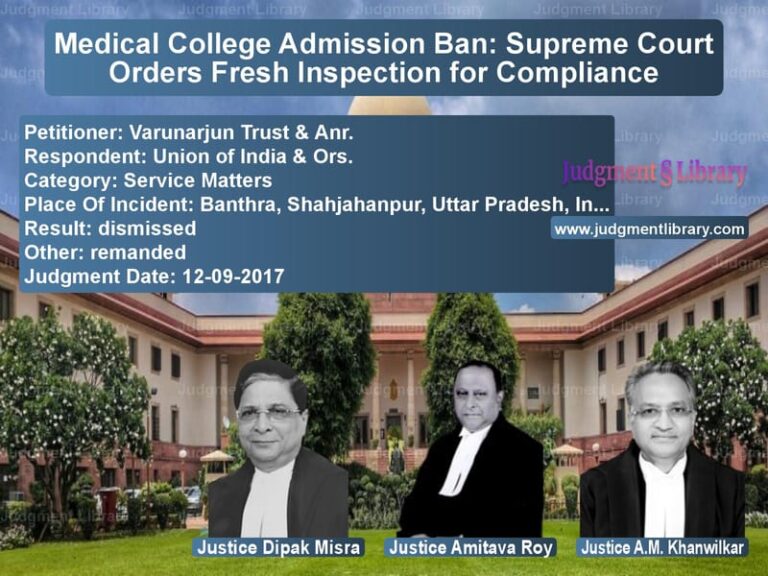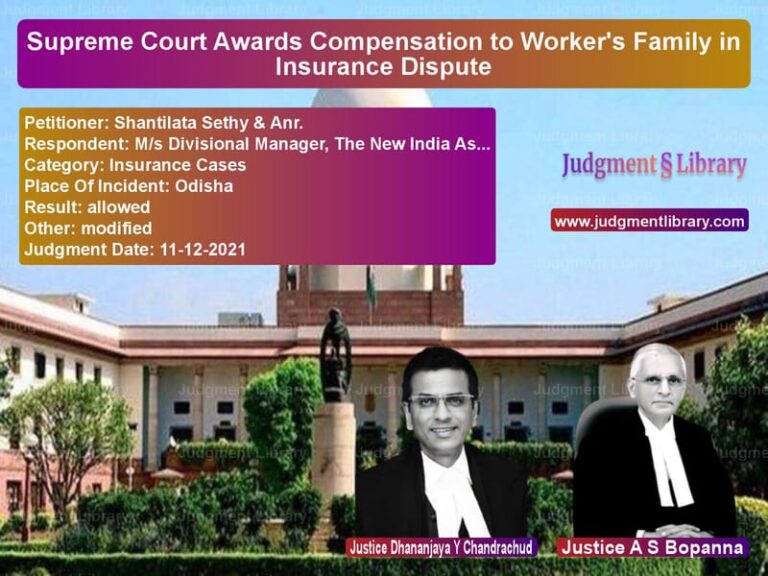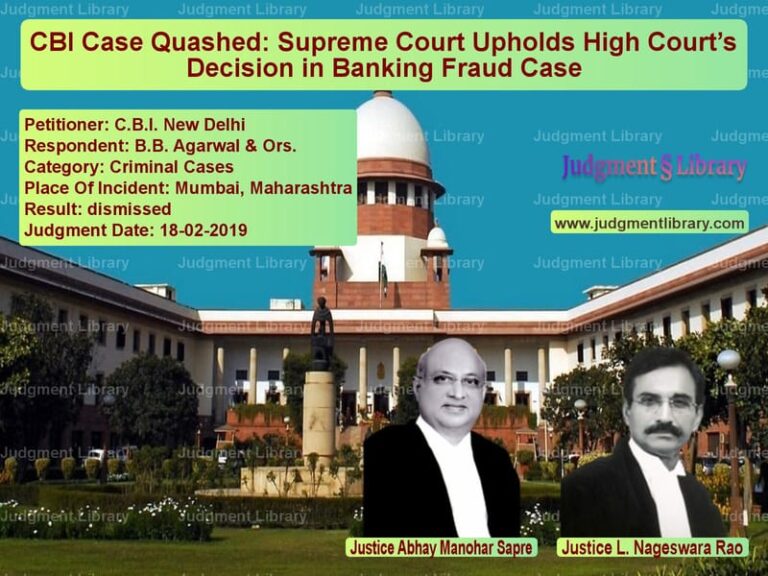Legal Consequences of Selling Drugs Without a Valid License: Supreme Court Analysis
The case of State Rep. by the Drugs Inspector vs. Manimaran is a significant legal matter concerning the illegal sale of drugs without a valid license under the Drugs and Cosmetics Act, 1940. This case highlights the necessity of adherence to drug control laws in India and the repercussions of violating these laws. The Supreme Court delivered a crucial judgment on 30th November 2018, setting an essential precedent on the stringent enforcement of licensing requirements in the pharmaceutical sector.
The issue arose when the Drugs Inspector inspected a medical shop owned by the respondent, Manimaran, and found that he had stocked and sold drugs without a valid license. The trial court convicted the respondent under Sections 27(b)(ii) and 28 of the Drugs and Cosmetics Act and sentenced him to one year of rigorous imprisonment along with a fine. However, the High Court later overturned this conviction, citing procedural lapses, including the non-examination of former license holders.
Background of the Case
The legal proceedings against the respondent commenced when officials of the Drugs Control Department inspected the premises of M/s. Sri Balaji Medicals on 17th December 2008. During the inspection, the authorities found that:
- The respondent did not possess a valid license to store or sell drugs.
- 87 different types of medicines were stocked without authorization.
- There was no legal document or record supporting the sale of these drugs.
Following the discovery, the Drugs Inspector immediately seized the drugs and initiated criminal proceedings against the respondent. The case was subsequently tried before the trial court.
Key Arguments by the Petitioner
The prosecution, represented by the State Drugs Inspector, argued that:
- The respondent was engaged in the sale of drugs without obtaining the necessary legal license, violating Section 18(c) of the Drugs and Cosmetics Act.
- He failed to provide any documentation regarding the procurement and distribution of the drugs.
- The High Court erred in overturning the conviction based on procedural aspects, as the absence of former shop owners’ testimony did not affect the fundamental nature of the offense.
- The respondent had signed a written admission (Ex-P4) confirming that he did not hold a valid license.
Defense by the Respondent
The respondent’s primary arguments were:
- The original license holders, Kamalakannan and Jayanthi, were not examined as witnesses.
- His signatures on critical documents (Exs. P-4, P-7, and P-10) were obtained on blank papers, rendering them inadmissible.
- The prosecution failed to establish beyond doubt that he was directly responsible for stocking and selling the drugs.
Supreme Court’s Analysis
Upon reviewing the case, the Supreme Court emphasized the following legal aspects:
- Strict Enforcement of Drug Laws: The court reiterated that the sale of drugs without a license is a serious offense that endangers public health and must be dealt with strictly.
- Validity of Written Admission: The court dismissed the respondent’s claim that his signatures were obtained on blank papers, deeming it an afterthought.
- Irrelevance of Former License Holders’ Testimony: The prosecution’s case was based on solid documentary evidence, making the testimony of previous owners unnecessary.
- Procedural Compliance: The court noted that procedural lapses, if any, did not weaken the substantive legal violation committed by the respondent.
Final Judgment
The Supreme Court set aside the High Court’s acquittal and reinstated the respondent’s conviction under Sections 27(b)(ii) and 28 of the Drugs and Cosmetics Act. However, considering mitigating factors such as the passage of time since the offense and the respondent’s lack of prior convictions, the Court reduced the sentence from one year to three months of imprisonment while maintaining the fine of ₹5,000.
Implications of the Judgment
This landmark ruling underscores the critical importance of compliance with licensing regulations in the pharmaceutical industry. It sends a strong message that:
- Unlicensed sale of drugs is a punishable offense with severe legal consequences.
- Judicial leniency in procedural technicalities does not override the substantive violations of law.
- The enforcement of the Drugs and Cosmetics Act is vital to ensuring the safety and well-being of the public.
Conclusion
The Supreme Court’s ruling in State Rep. by the Drugs Inspector vs. Manimaran establishes a strong legal precedent for dealing with violations of the Drugs and Cosmetics Act. The judgment highlights the necessity for medical shop owners to strictly adhere to licensing regulations and serves as a deterrent against illegal drug sales. By upholding the law and ensuring accountability, the court reinforces its commitment to public health and safety.
Petitioner Name: State Rep. by the Drugs Inspector.Respondent Name: Manimaran.Judgment By: Justice R. Banumathi, Justice Indira Banerjee.Place Of Incident: Bargur, Tamil Nadu.Judgment Date: 30-11-2018.
Don’t miss out on the full details! Download the complete judgment in PDF format below and gain valuable insights instantly!
Download Judgment: State Rep. by the Dr vs Manimaran Supreme Court of India Judgment Dated 30-11-2018.pdf
Direct Downlaod Judgment: Direct downlaod this Judgment
See all petitions in Drug Possession Cases
See all petitions in Judgment by R. Banumathi
See all petitions in Judgment by Indira Banerjee
See all petitions in allowed
See all petitions in supreme court of India judgments November 2018
See all petitions in 2018 judgments
See all posts in Criminal Cases Category
See all allowed petitions in Criminal Cases Category
See all Dismissed petitions in Criminal Cases Category
See all partially allowed petitions in Criminal Cases Category


